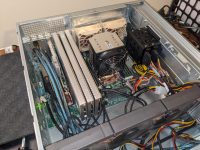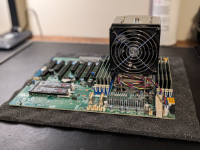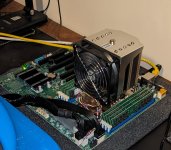All of that said, even if I did have a CPU/motherboard that supported Gen5, I wouldn't be buying a Gen5 SSD quite yet.
The Drives just aren't ready yet for the most part. It's just generic Phison rebrand after generic Phison rebrand.
The high sequential speeds are all good and well, but they are mostly useless unless you are repeatedly copying large files between similarly fast drives. I'm waiting for better 4k random reads.
There are a string of reviews out there touting the Crucial T705 as the "fastest SSD" but if you look at testing, the low queue depth 4k random reads are pretty abysmal.
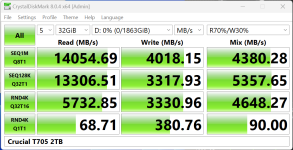
68.71 MB/s is pathetic.
Not only are my Gen4 Samsung 990 Pro, Samsung 980 Pro and WD Black SN850x drives faster than this in the 80-90 MB/s range, but my Gen3 Intel Optane 905p is WAY faster than this 239MB/s
That's 3.5x faster in a six year old product.
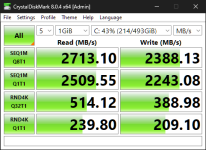
That high RND4k read figure makes a system so much more responsive and faster feeling in most realistic cases. I am still using the 905p as my boot drive:
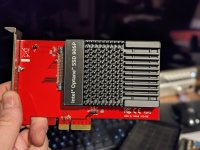
Even with its max sequential speed becnhed at 2700MB/s the system feels much faster than when I booted off of my 2TB Samsung 990 Pro which I benched at 7500 MB/s.
I wish I could have both higher sequential speeds
and higher 4k random speeds, but unfortunately that doesn't seem to be an option.
Don't get me wrong, I'm not holding out for something to beat the Optane (that pretty much isn't going to happen unless I find a good deal on an Optane DC P5800X which pretty much isn't going to happen.) but I am likely going to wait when it comes to moving to Gen5 until something better than the garden variety Phison rebrands is available. Maybe Samsung or WD drives.
I also really wish the marketing people didn't keep pushing higher and higher sequential bandwidth. It is at the point where it is mostly useless. Shift the number. Start battling on QD1 4k random reads instead. THAT will make a huge difference.
We don't NEED Optane to drive improvements in 4k random speeds.

